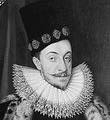
Sigismund III
1566-1632
King of Poland and Sweden
Son of John III of Sweden and Catherine of Poland. Elected to the throne of Poland in 1587, he also inherited the Swedish crown ten years later.
He tried to restore Catholicism to Sweden, but when he left Sweden for Poland
the regent, his uncle (later Charles IX) rebelled, defeated and deposed him in 1599.
The two countries remained intermittently at war until 1660.
www link :
Biography
.

Shivaji
c.1627-80
Maratha Ruler
Founder of the 17th century Maratha kingdom in west India.
He carried on a protracted war against the Mogul rulers of northern India. He was enthroned as an independent sovereign in 1774. Later he became known for his religious tolerance and social reforms.
Maratha Wars
www link :
Biography
.

Baron Heinrich von Stein
1757-1831
Prussian Statesman
As Chief Minister in Prussia he instituted reforms, including the emancipitation
of serfs and local self-government.
After he was exiled by Napoleon (1808)
he become counsellor to Tsar Alexander I and played a leading part in forming
the anti-Napoleonic alliance between Russia and Prussia.
www link :
Biography
.

Sukarno
1901-70
Indonesian Statesman
As a leader of the Indonesian Nationalist party Sukarno was imprisoned by
the Dutch colonial authorities (1933-42). He was released by the Japanese
and cooperated with them.
After WW II he proclaimed himself President and
spent the next four years to drive out the Dutch. In 1963 he declared himself
President for life. His cooperation with the Chinese dominated Indonesian Communists
led to a bloody military coup in 1965. He was disposed and kept under house arrest until his death.
www link :
Biography
.

Sun Yat-Sen
1866-1925
President of China
Sun Yat-Sen studied medicine in Hongkong and Canton, and formed the "Revive China Society" in 1884.
Exiled in 1896 after organising an abortive uprising. He returned from the United States
during the 1911 revolution, and was elected provisional head of state but resigned soon after.
In 1923 he gained control of the country with Russian support. He reorganised the Kuomintang
party whose "Three Principles of the People" inspired both Nationalists and Communists.
www link :
Biography